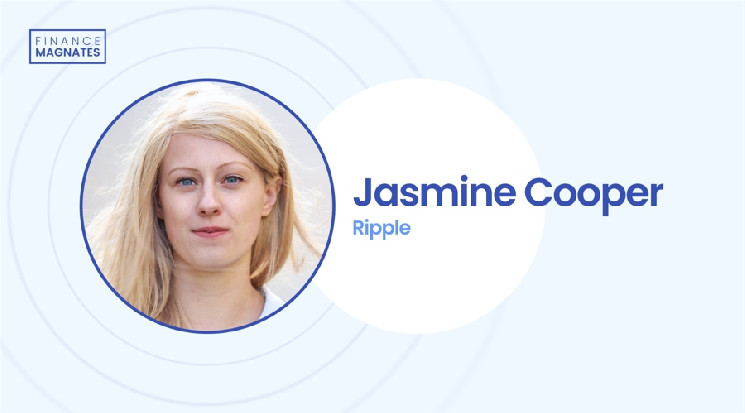On the ground for $XRP Ledger Apex 2024, we caught up with Jazzi Cooper, Lead Product Manager at Ripple X and a major driving force behind its ambitious mission. In an exclusive interview, Jazzi shared insights into Ripple X's role in reshaping the financial landscape and paving the way for a future powered by blockchain technology.

Why Traditional Finance Needs a Disruption
"Traditional finance rails today, as we know, are insufficient. Payments take multiple days if not weeks (...) and settlement is slow," Jazzi remarked, setting the stage for a discussion on the urgent need for disruptive solutions in the financial sector.
The bold promise of blockchain technology lies in its potential to revolutionize financial systems, a vision embodied by Ripple X and its dedication to the $XRP Ledger. As traditional financial infrastructures strain under the weight of inefficiencies, Ripple X champions a future where transactions are swift, transparent, and decentralized. This ambition is not merely a theoretical exercise but a concerted effort to redefine how value is transferred and recorded.
One of the main drivers for this charge is Jasmine Cooper, affectionately known as Jazzi, who heads the Institutional DeFi Products group. Her team’s mission is to cultivate a suite of products that capitalize on the unique strengths of the $XRP Ledger, thus offering a robust alternative to the entrenched financial systems that dominate today's markets.
On Redefining Value Transfer
"The $XRP Ledger is purpose-built for value transfer. We think it's a very ideal blockchain environment for the issuance, the movement, the trading of tokens," Jasmine emphasizes, underscoring the platform's suitability for disrupting traditional finance.
Central to Ripple X's strategy are three key product verticals: tokenization, financial protocols, and infrastructure. Tokenization involves the creation of digital tokens that represent real-world assets, offering a new avenue for asset management and investment. Financial protocols cover on-chain trading and lending, leveraging blockchain’s transparency and efficiency. The infrastructure vertical focuses on building the essential components, such as oracles and cross-chain bridges, which support the seamless operation of these systems.
Out with the Old?
"Most of fintech today, all of your neobanks, all of your digital wealth advisors, these have moved a little bit forward by offering nice UIs... But they're still sitting on the same old rails.”
As a stark contrast, one of the most exciting developments at Ripple X is the introduction of multipurpose tokens, a new standard designed for the tokenization of real-world assets.
"We've introduced a new token standard called multipurpose tokens that's purpose-built for tokenization of real-world assets," explains Jasmine, shedding light on Ripple X's commitment to innovation.
This innovation allows metadata to be directly attached to the blockchain asset, ensuring a higher degree of reliability and utility. Such advancements pave the way for more sophisticated use cases, such as bond and equity tokenization, and open up new possibilities for asset management and investment.
Accessible Blockchain for All: User-Centric Design & Financial Inclusion
Shifting gears, Jasmine’s perspective on the interplay between technology and society underscores a fundamental truth: technology must align with user needs and expectations to achieve widespread adoption.
“We ultimately have to meet people where they are in terms of their tolerance for usability, for risk, for trust, user experience that they demand across the board," Jazzi added.
This principle guides Ripple X’s development efforts. Instead of imposing complex, crypto-native solutions that might alienate everyday users, Ripple X aims to meet users where they are, providing intuitive and accessible products that leverage blockchain’s advantages without overwhelming complexity, thus emphasizing the importance of user-centric design.
Financial inclusion is another cornerstone of Ripple X’s vision. By democratizing access to financial services, blockchain technology can empower individuals in regions where traditional banking infrastructure is inadequate or nonexistent. Decentralized lending protocols, for example, can offer capital to those who lack access to conventional financial institutions, thus fostering economic opportunities and growth in underserved communities.
Looking ahead, Ripple X is poised to make significant strides in the realm of real-world asset tokenization. Upcoming announcements and projects promise to further integrate blockchain technology into various sectors, enhancing the liquidity and utility of digital assets. Additionally, the EVM side chain initiative aims to bridge Ethereum’s extensive developer community with Ripple’s robust infrastructure, creating synergies that could drive further innovation and adoption.
Wrapping up
In the face of skepticism and the noise surrounding cryptocurrencies, Ripple X’s commitment to practical, impactful solutions stands out. By focusing on real-world problems and developing technology that enhances user experiences, Ripple X is not only pushing the boundaries of what blockchain can achieve but also ensuring that these advancements are accessible and beneficial to a broad audience. The future of finance, as envisioned by Ripple X, is one where blockchain technology seamlessly integrates into our daily lives, enhancing efficiency, transparency, and inclusion in ways that traditional systems have long struggled to deliver.
 financemagnates.com
financemagnates.com
